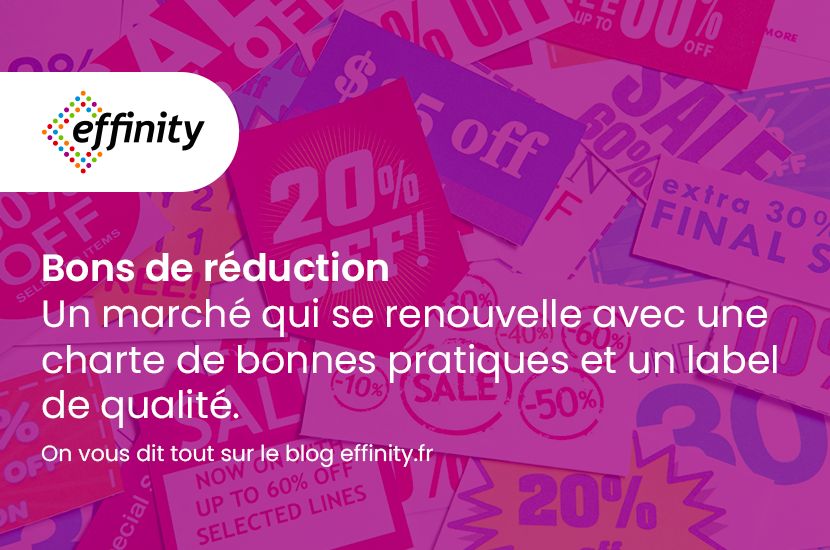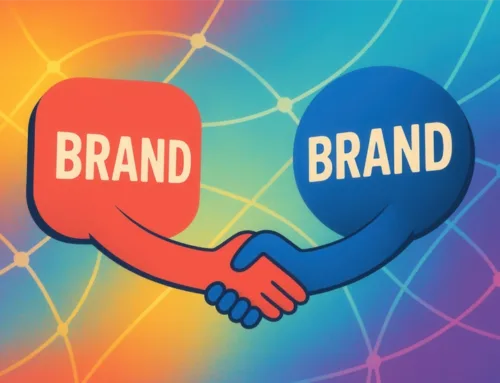Over the past few years, the coupon market has gone off the rails. Buying branded keywords, invalid or expired codes, shared CRM codes… These prohibited yet widespread practices have tarnished the image of the coupon lever, leaving advertisers perplexed by this type of publisher. And yet, when properly mastered, this lever brings numerous benefits to brands (sales, new customers, visibility, ROI, etc.). Under the chairmanship of Effinity, the CPA (Collectif pour les acteurs du marketing digital) has decided to come to the rescue of a lever that is gradually being abandoned by advertisers. The aim was to clean up a market in shambles. The result is the Vouchers Charter. The Charter is the initiative of the CPA, but also of affiliation platforms and six coupon publishers aware of the situation.
A charter to promote good couponing practices
As defined by the CPA, the Coupon Charter is a code of best practice for the operation of website publishers whose main business model is the distribution of promotional codes. Its aim is to provide a framework for publishers’ promotional code distribution activities, to ensure that they offer clear, relevant information, generate quality traffic for advertisers and guarantee an optimal user experience.
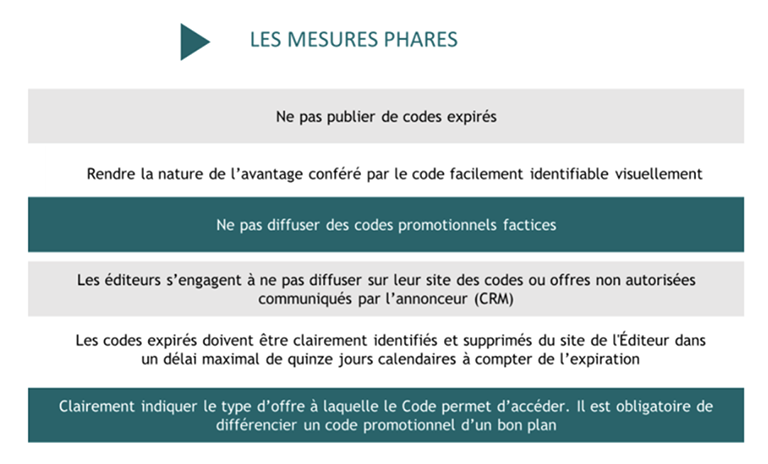
The charter specifies the rights and obligations of publishers with regard to code distribution.
– The signatories undertake to respect the rules of distribution
– Signatories agree to be audited
– The signatories undertake to intervene promptly if an infringement is observed.
– Signatories subject to penalties for non-compliance
To implement these measures, the joint commission, made up of signatory publishers and affiliation platforms, meets once a month to review progress on the charter and compliance with best practices.
On the control side, the CPA mobilizes all signatory members (platforms and publishers) as well as a third-party partner. Checks are carried out on a daily basis, and infringements are reported directly to the signatory publishers concerned. For seriousness 2 infringements, publishers have a maximum of 12 hours to make the correction. Seriousness 1 infringements, deemed unacceptable, are directly sanctioned:
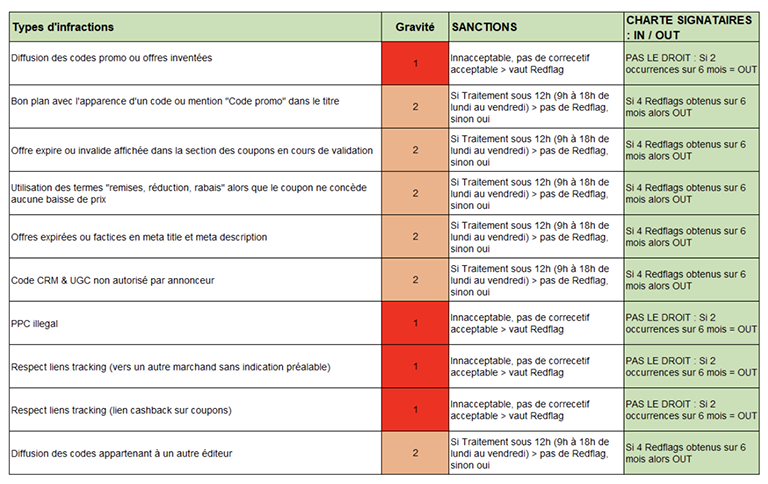
Improved coupon quality
This control process is now bearing fruit:
– An average of 3,000 checks are carried out every month
– 9 out of 10 codes are operable on first inspection
– In December 2021, the anomaly rate is 6% VS 20% in June.
These KPIs reflect the considerable investment made by the various players in enforcing this charter of best practice, guaranteeing not only quality traffic for advertisers, but also clear, relevant information for users.
There are now 27 signatory publishers committed to this quality approach.
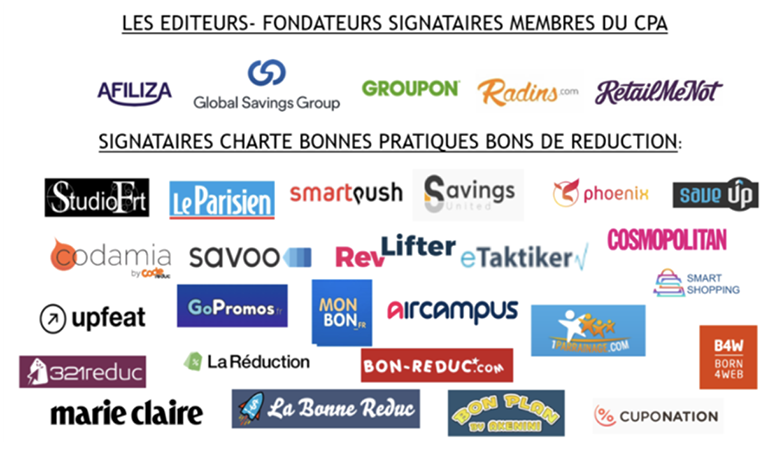
To promote the highest-quality signatory publishers, the charter offers a label. The label is awarded twice a year to publishers who have not received a red card or redflag during the period under review. Thanks to their quality, these certified publishers will naturally be promoted to advertisers. Following nearly 16,000 tests carried out in the second half of 2021, 11 sites were awarded the label at the first session held in January 2022:
|
bonplans.akenini.com |
codespromo.lefigaro.fr |
monbon.fr |
|
codamia.com |
dealabs.com |
poulpeo.com |
|
codepromo.lequipe.fr |
groupon.fr |
vouchercloud.fr |
|
codepromo.20minutes.fr |
ma-reduc.com |
Effinity is a signatory to this charter, and is committed to this quality approach, along with other publishers. We wish to highlight the value of these signatories and encourage advertisers to work with them. To identify them within the platform, an orange certification pictogram has been added to the nickname. Signatory publishers can now be recognized quickly and easily. However, all coupon publishers are free to apply for all programs open to the typology, and each advertiser is free to work with the publishers of its choice. Signatory or not.
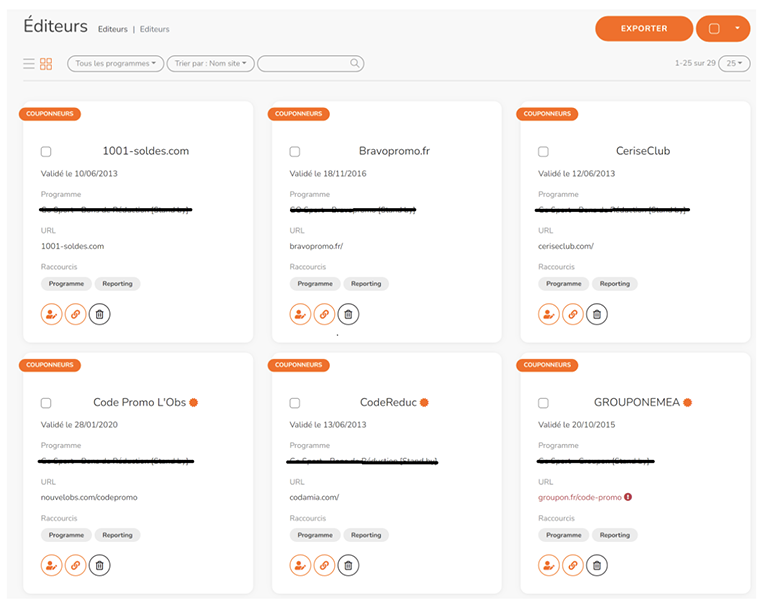
The Voucher Charter now lays the foundations for a genuine quality approach involving all players in the sector. Through these rules and controls, the aim is to protect and perpetuate this lever by re-installing a relationship of trust between the various players: users, publishers and advertisers.
Mis à jour le 23 January 2025
Mis à jour le 23 January 2025

